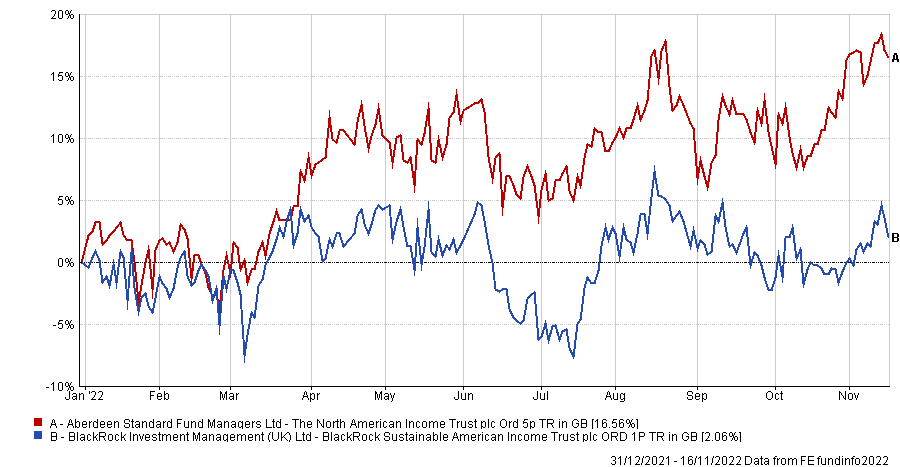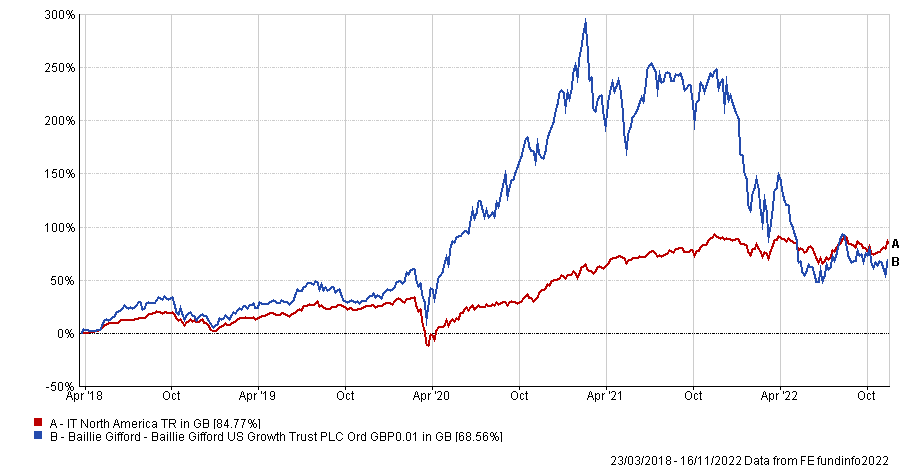Trusts investing in the growth-oriented US market have faced challenging conditions this year as their investment style falls out of favour.
High interest rates and rising inflation have put a dampener on growth stock’s soaring performance, with the IT North America and IT North American Smaller Companies sectors dropping 2.1% and 12.6% since the start of the year.
On the bright side, declining markets could offer an attractive entry point for investors looking to increase their exposure to the US. Here, Trustnet looks at the US trusts trading on the biggest discounts compared to their five-year averages.

Source: QuotedData
The JPMorgan US Smaller Companies trust was on the biggest discount compared to its historical average, down 4.4 percentage points from the 3.2% discount it traded at on average over the past five years.
This is despite a total return of 330.3% over the past decade, which makes it among the top performer out of the two trusts in the IT North American Smaller Companies sector and ahead of its benchmark, as the below chart shows.
Total return of trust vs Russell 2000 index over the past decade
.png)
Source: FE Analytics
Its wider discount may be because returns this year have slumped – the trust is down 11.7% but Tom Sparke, investment manager at GDIM, said that this made it look attractive. The current 8.1% discount is a bargain for investors, who are buying a trust that has “an enviable track record in upward-moving markets”.
Like many portfolios in the US, it has been dragged down by dwindling sentiment towards growth stocks, but it could be well-positioned for a rapid recovery when market conditions improve.
Sparke said: “The fund has selected intelligently from the stocks available in the Russell 2000 and now has an eclectic mix of companies from various sectors.”
Indeed, the trust’s 10.3 percentage point overweight to industrials suggest it is positioned for a turnaround in economic growth, but these stocks are not “value” plays.
Conversely, the 7 percentage point underweight to healthcare and its lack of energy stocks compared to the Russell 2000 benchmark suggest it is not as skewed to cheap stocks as the market is.
More cautious investors may want to go for a more value-weighted portfolio, but JPMorgan US Smaller Companies has the potential to make higher returns at the expense of more volatility, Sparke added.
“I would say that this may well be an excellent entry point for the long-term investor who can tolerate some volatility along the way,” he said.
The BlackRock Sustainable American Income trust was on the second largest discount to its five-year average, down 2.9 percentage points to 5.9%.
The £161m portfolio introduced its environmental, social and governance (ESG) theme in July 2021, but James Carthew, head of investment companies at QuotedData, said that “it hasn’t done much for its rating or its performance”.
Since its rebrand, the trust has been outperformed by “its main competitor” – the North American Income trust. Likewise, the rival fund has high exposure to value stocks, which has helped its performance in the current environment. It has made 16.6% since the start of the year while the BlackRock Sustainable American Income trust is up just 2.1%, as the below chart shows.
Total return of trusts in 2022

Source: FE Analytics
“It can also boast much better dividend growth and dividend cover than the BlackRock fund,” Carthew added.
The abrdn trust is trading at a larger discount to its Blackrock rival, at 8.3%, but the change from its five-year average is slightly shallower, at 1.9 percentage points.
Carthew said that the Baillie Gifford US Growth trust was also worth considering, although the portfolio is not included in the data because its track record is shorter than five years.
The £630m portfolio was launched in March 2018, and returns have increased by 68.6% since inception, falling from a 292% high in 2021.
Total return of fund vs sector since launch

Source: FE Analytics
Due to its growth bias, the trust dropped more than 22 times as far as the sector average this year at a considerable 45.8%. This dragged its discount to 13.5%, the biggest of both sectors.
However, it is still the US trust of choice for Jason Hollands, managing director of Bestinvest, who said the appeal is that US businesses are typically remaining private for longer than they did in the past and grow at a particularly rapid rate, which should benefit this portfolio as half of its holdings are unlisted.





